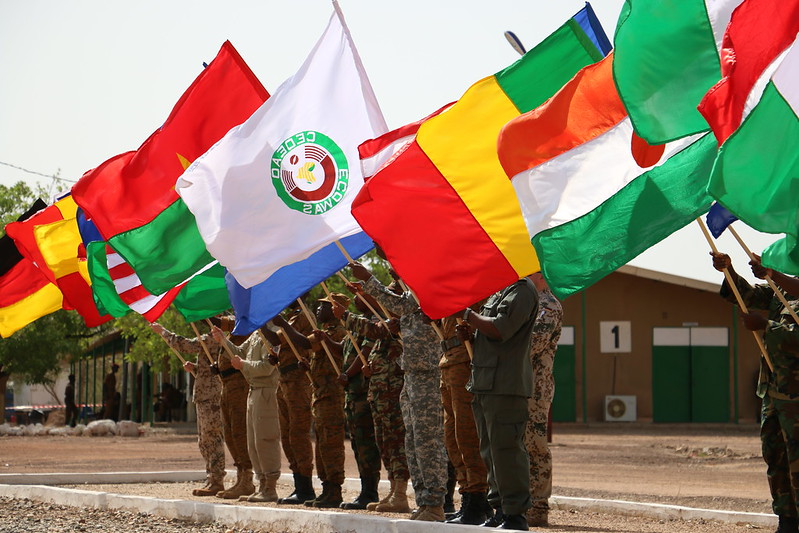Military juntas from across the Sahel have threatened to pull out of The Economic Community of West African States. This raises questions about regional stability and the stated aims of returning to civilian rule, writes Abubakar Abubakar Usman.
A wave of military coups in West Africa has unleashed a new and unexpected development: “Sahelexit” with the military junta-led countries of the Sahel removing themselves from The Economic Community of West African States (ECOWAS).
On 28 January 2024, Mali, Niger, and Burkina Faso announced their joint decision to formally withdraw from ECOWAS and have signed a mutual defence pact called The Alliance of Sahel States. The move comes in response to ECOWAS’s threat of military intervention to restore democracy in Niger.
The Sahel nation’s withdrawal from ECOWAS draws parallels to Britain’s departure from the European Union (EU), although their motivations and methods differ significantly. While both instances reflect sovereignty concerns, and threaten to undermine regional multilateralism, the comparison diverges in their democratic processes. Brexit transpired through democratic channels, involving the active participation of the electorate. Sahelexit was orchestrated through authoritarian means, devoid of the involvement of the affected countries’ populations.
The intentions of the military juntas
Sahelexit reveals a reluctance on the part of the military juntas to relinquish power to civilian authorities anytime soon.
Mali’s military junta initially pledged to restore civilian governance by March 2024. Similarly, Burkina Faso’s junta committed to a 24-month transition period, suggesting a return to civilian rule by the end of 2024. Niger’s junta has extended its timeline but has promised a return to civilian governance within three years, stretching until 2026.
Among these pledges, only Niger’s junta extends beyond the one-year timeframe before their withdrawal from ECOWAS takes effect. This raises questions about the sincerity of the juntas’ commitments. If their intention is indeed to restore civilian rule, why make decisions that extend beyond that remit and could then potentially be reversed?
Another potential explanation for Sahelexit is that it could be a strategic bluff orchestrated by the juntas to pressure ECOWAS into easing the sanctions imposed on them. ECOWAS has claimed not to have received any formal written notice from the Alliance members regarding their intention to withdraw, as required by the revised ECOWAS Treaty. Instead, the juntas merely announced their immediate withdrawal, a move that directly contradicts the treaty to which they are all signatories. This discrepancy raises doubts about the sincerity of their withdrawal and suggests the possibility of ulterior motives behind the abrupt announcement.
Regional multilateralism
ECOWAS responded well by not allowing this internal division to spiral out of control. Maintaining the involvement of the Alliance members within the organisation offers a more constructive path if the goal is to facilitate their return to civilian governance. Their departure threatened to unleash disruptive regional dynamics with detrimental implications for peace, security, and development. ECOWAS’s imposition of tough sanctions risks further alienating the populations of these countries, fostering negative sentiments toward the regional bloc. As public opinion in the Alliance members’ nations turns increasingly against ECOWAS, convincing them to rejoin the organisation post-transition to civilian rule becomes significantly more challenging.
Just like Brexit, allowing Sahelexit to proceed unchecked would have ultimately proven detrimental to all involved parties. Given the fragile nature of West Africa’s security and development landscape, the region was poised to endure significant setbacks if Sahelexit materialises. This departure may even catalyse interstate violent conflicts, a phenomenon that remains largely foreign to the region. As such, it is imperative for stakeholders to work diligently toward resolving these differences and preserving regional unity to mitigate the potentially dire consequences of Sahelexit.
Compromise
While ECOWAS’ pragmatic response, exemplified by the lifting of sanctions on member nations, is laudable, it brings to light concerns regarding the potential for further coups in the region. The successful negotiations with junta-led countries, resulting in compromises by ECOWAS, may inadvertently send a message to other member states that military coups could yield favourable outcomes. This presents a dilemma for ECOWAS. Despite the desirability of democracy, the regional bloc may need to consider adopting less intrusive policies that would not jeopardise its survival under the guise of democracy promotion.
Many purported democracies within the ECOWAS region fall short in governance metrics compared to their military junta-led counterparts. These metrics include political stability, government effectiveness, regulatory quality, rule of law, and control of corruption. It is imperative for ECOWAS to prioritise the enhancement of these governance indicators over merely focusing on superficial democratic processes such as elections and voting. By doing so, the likelihood of future occurrences akin to Sahelexit can be mitigated.
Photo credit: Wikicommons used with permission CC BY-SA 3.0 DEED


